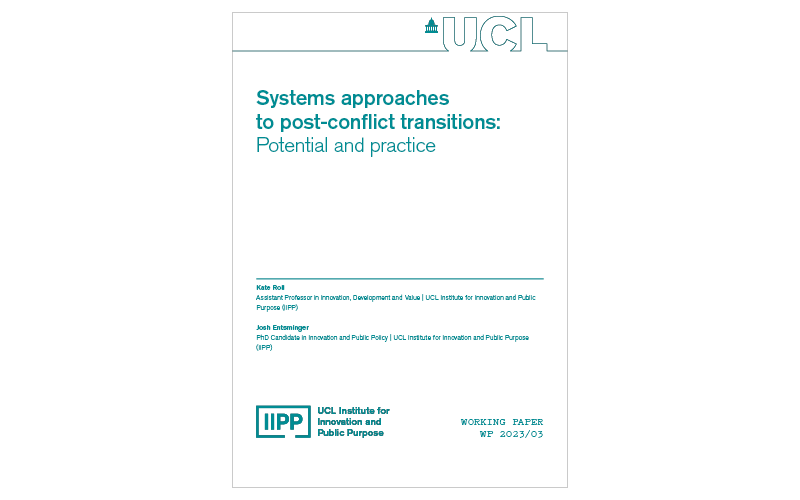Systems approaches to post-conflict transitions: Potential and practice
This working paper examines the potential role of systems thinking, analysis and innovation in supporting work on post-conflict transitions and the recovery of conflict-affected states.

27 February 2023
UCL Institute for Innovation and Public Purpose (IIPP) Working Paper Series: IIPP WP 2023-03
Authors:
- Kate Roll | Professor of Innovation, Development and Purpose | UCL Institute for Innovation and Public Purpose (IIPP)
- Josh Entsminger | Honorary Research Fellow | UCL Institute for Innovation and Public Purpose (IIPP)
Reference:
Roll, K. and Entsminger, J. (2023). Systems approaches to post-conflict transitions: Potential and practices. UCL Institute for Innovation and Public Purpose, Working Paper Series (IIPP WP 2023-03). https://www.ucl.ac.uk/bartlett/public-purpose/wp2023-03.
Abstract:
This working paper examines the potential role of systems thinking, analysis and innovation in supporting work on post-conflict transitions and the recovery of conflict-affected states. This responds to a surging interest in systems approaches to handle uncertainty and complexity, concerns around the adequacy of linear approached, and a gap in connecting big ideas around systems to a specific, challenge context. To do so, the paper takes on three questions: What is systems thinking? How does systems thinking complement or contradict current thinking and practice around post-conflict transitions? And, finally, for organisations interested in systems approaches, what innovations are necessary to how they work and the systems in which they sit to make this approach possible? The paper finds that systems thinking, tools, and approaches to change show promise, particularly as analytical techniques for building understanding and shared meaning and as a new way of thinking about leverage points and interconnected interventions. The structural or architectural view of systems also lends new insights into terms such as fragility, resilience, and intractability. The paper ends by turning these analyses towards the organisations themselves, concluding with the core systems insight that intervenors are not only part of the system which they seek to support but also that they sit within their own systems and routines. This paper is written with the interests and concerns of post-conflict practitioners in mind; however, it may be of broader interest to scholars of systems thinking and peace and conflict studies.
 Close
Close

